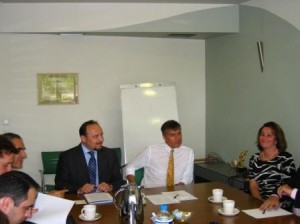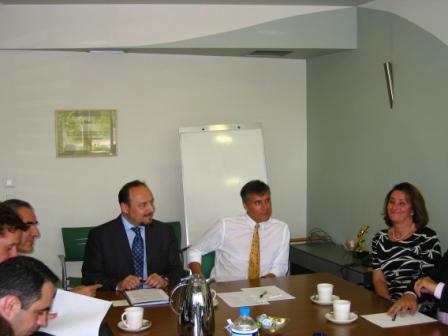 ELIAMEP organised a discussion with Mr. Davor Vidis, Director of Neighbouring Countries and South Eastern Europe, Ministry of Foreign Affairs of Croatia on “Croatia’s relations with its neighbouring countries”, on 14 May 2009. Croatia completes this year eighteen years of existence as a modern state, and is a candidate state for entering the EU while it currently serves as a non-permanent member of the Security Council. Emerging from the civil war of Yugoslavia in the early 1990s and the challenges thereafter, Croatia is following today a forward looking strategy of stability and reconciliation based on a three fold axis:
ELIAMEP organised a discussion with Mr. Davor Vidis, Director of Neighbouring Countries and South Eastern Europe, Ministry of Foreign Affairs of Croatia on “Croatia’s relations with its neighbouring countries”, on 14 May 2009. Croatia completes this year eighteen years of existence as a modern state, and is a candidate state for entering the EU while it currently serves as a non-permanent member of the Security Council. Emerging from the civil war of Yugoslavia in the early 1990s and the challenges thereafter, Croatia is following today a forward looking strategy of stability and reconciliation based on a three fold axis:
Creating a stable democracy based on a series of internal reforms, establishing good relations with the neighbouring countries by solving bilateral problems and identifying points of cooperation and finally assuming an active role in the region and in the world.
In handling relations with the neighbours Croatia’s goal is to follow a course of pragmatism which includes the planning of common policies while attempting to keep a low-key profile in order not to allow for the resurfacing of conflicts stemming from the past in the media. One of Croatia’s outstanding issues is the question of border demarcation, which was also the reason for which Slovenia is been blocking the continuation of EU accession negotiations. While this issue is regarded as solemnly bilateral from many neighbouring countries of Croatia, it does affect nevertheless the entire region as a flagship example for the workings of the EU, left open for interpretations. Taking countries of the region individually
Bosnia-Herzegovina
Croatia has signed but not yet ratified, a border demarcation agreement, while also pursuing a strict policy of respect for Bosnia’s three-nation identity, of which one are Croats, and territorial sovereignty.
Serbia
Relations between the two countries had been gradually improving since the 1990s; however the unilateral declaration of Kosovo’s independence was a serious setback, as Croatia has recognized Kosovo. Following a period of disruption, today diplomatic relations have been resumed pending the level of Foreign Affairs Ministers. On the question of border demarcation with Slovenia, while Serbia wishes the problem to be solved as soon as possible, it views it as bilateral and remains uninvolved.
Montenegro
While in the past there had been a quarrel over the border, today it is solved while they have agreed on a third-party involvement by the ICJ.
Hungary and Italy
Both countries have normal relations with Croatia, actively supporting its candidacy to the EU by providing technical help and support for facilitating EU integration.
Slovenia
While the two countries are active trade partners and have established strong social links, they currently face a sea-border demarcation problem. While it could be viewed as a classical border dispute and according to one side Croatia has a better legal
Position, Slovenia is in a better place politically, being a member of the EU. Pending a solution of the problem, Slovenia is vetoing the opening of 11 chapters of negotiation for Croatia’s EU accession and the matter has currently acquired high visible and political importance. Slovenian public opinion appears to have adopted a strong emotional position towards the country’s entrance to the high-seas, vis-à-vis Croatia’s significantly larger portion of sea shore, which for certain parties has made the matter even more difficult to deal with. Croatia has suggested a third-party mediation and is currently awaiting Slovenia’s reply.
All and all the question and dilemma for policies in the region remains – how to strike the fine balance between politics and law?



